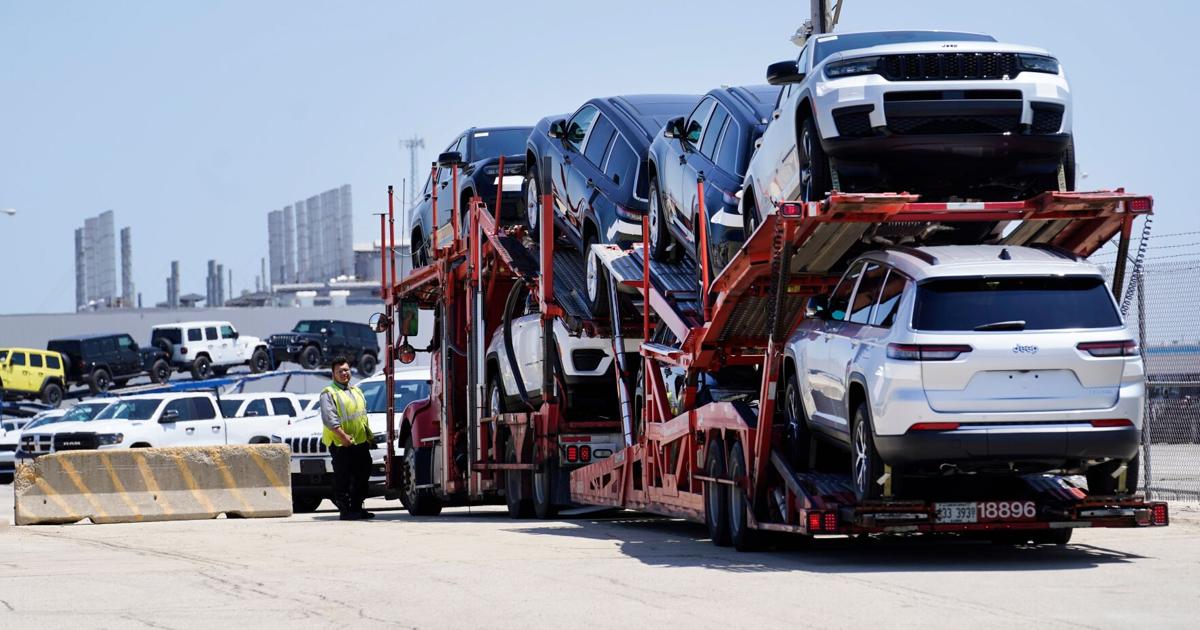Being in Donald Trump’s crosshairs is already harming the Canadian economy, and it’s not going to get any better for the foreseeable future, according to economists surveyed by the Star.
It’s clear that tariffs are here to stay, after more than three decades of increasingly-free trade across the 49th parallel, said Jim Stanford, chief economist at the Centre for Future Work. That’s even truer now than it was before Trump’s late-night social media outburst Thursday in which he announced he’d ”terminated” all trade negotiations with Canada.
The implication, said Stanford, isn’t pretty, even if Trump hasn’t ripped up the Canada-U.S.-Mexico Agreement on trade.
“It will be a serious shock for the obvious reason that we’ve organized our economy around exports to the U.S. for the last 35 years,” said Stanford.
Renegotiation of CUSMA — NAFTA’s successor — is scheduled for next year, though Trump has already mused publicly about the possibility of ditching it altogether. If that did happen, said Stanford, it would be a major — but not fatal — blow to the Canadian economy.
“We would certainly see job losses in some of the traditional export industries. We’d have a recession that would probably last a couple of years and knock 3 or 4 per cent off of GDP,” said Stanford.
Still, Stanford said, the Canadian economy would eventually pick itself up of the floor and keep going.
“It is not remotely the end of the viability of Canada’s economy,” said Stanford. “We’ve had recessions before and it didn’t mean the end of Canada.”
The adjustment period wouldn’t be pretty if CUSMA gets ripped up, said Douglas Porter, chief economist at BMO.
“What if it really does completely fall apart? We don’t think that’s likely,” said Porter. “But there would almost certainly be a higher unemployment rate, during the adjustment period.”
The Bank of Canada, noted Porter, did a forecast looking at the impact to the Canadian economy of a broad-based 25 per cent tariff.
“They thought there might be a permanent loss of 4 per cent of GDP,” said Porter.
Even if CUSMA isn’t ripped up entirely, tariffs are here for the foreseeable future, Porter added.
“It increasingly looks like something with some pretty heavy-duty tariffs.”
Trump’s tariffs, and on-again, off-again trade negotiations, are already hurting the economy here, said Porter, who pointed to layoffs in the manufacturing sector, and steel industry.
“Moving away from free trade is one thing, but having 50 per cent tariffs on steel and aluminum is another,” he said.
International trade is a vital part of the Canadian economy, even if we supply many of our own goods and services, he added.
“It’s a big reason why Canada is as prosperous as it is, because we’ve had relatively free trade, not just with the U.S.”
The lingering uncertainty over just what tariffs will be in place, and at what levels, is already having a paralyzing effect on business decision-making, something which is spilling over into the broader Canadian economy, said Pedro Antunes, chief economist at the Conference Board of Canada.
“We’re almost at the worst stage. It’s eroding our investment and productive capital,” said Antunes. “Exports are 30 per cent of our economy and the U.S. is 76 per cent of that.”
Still, ripping up CUSMA entirely would be even more disastrous, Antunes said.
“There’s been a huge hit to Canada’s economy already,” said Antunes. “We’re already in dire straits. Anything that worsens that would easily put us into a recession.”
Even if Canada weren’t being targeted by Trump’s tariffs and trade policy, a broader trade war hurts the U.S., meaning the Canadian economy gets sideswiped as well, he added.
“The U.S. is shooting itself in the foot. Just by itself, that hurts Canada because we’re so closely tied to them. … Especially on manufactured goods, we really need the U.S. consumer,” said Antunes.
Still, said the Centre for Future Work’s Stanford, there’s at least one thing that could push the U.S. back to the negotiating table: self-interest.
“The U.S. still needs our stuff. The Americans are going to lose as much as we are if the trade relationship blows up,” said Stanford, before noting, wryly, that self-interest and self-awareness aren’t always a given. “We can’t stop them from shooting themselves in the foot.”



